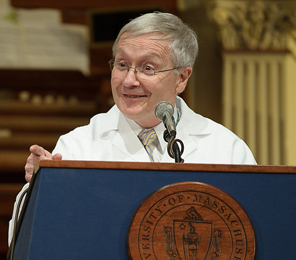
John Zawacki, MD
In a world intent on controlling health care costs, putting a value on compassionate care can be difficult. Allowing for the extra time needed to connect with a patient, to show compassion at a time of vulnerability, seems to go against the concept of making the health care experience more streamlined and efficient. But in his many years as a doctor and teacher, John Zawacki, MD, has found the opposite to be true.
“Compassion in health care is cost efficient when you are creating interpersonal relationships,” said Dr. Zawacki, professor of medicine, who received the 2012 Schwartz Center Compassionate Caregiver Award. All the hi-tech tests in the world often can’t get to the heart of patients’ problems, motivate them to follow recommended care, or engender understanding to diffuse the threat of a malpractice suit if a mistake is made in care.
“Medicine is in the details, and sometimes we get concerned about covering all the bases and doing all the many tests available,” he said. “But really listening to patients can often reveal more about their problems.”
Zawacki told the story of a patient he encountered when he was running behind schedule, and in a not-too-compassionate mood. Before he talked to her, he was given a bulging file containing her medical history, representing months of unsuccessful efforts to come up with a solution to her stomach pain. Upon meeting her, he put his impatience aside when saw how much pain she was in. What all those test didn’t reveal, and Zawacki was able to coax from his patient through a compassionate conversation, was that her troubles began shortly after her husband died. Her tears revealed the rawness of her grief, and that knowledge factored into his treatment and her relief of symptoms.
Numerous studies have shown that a strong interpersonal connection between health care worker and patient can lead to better health care outcomes. But a 2011 paper by researchers from the Schwartz Center noted that while 78 percent of physicians felt most health care professionals provide compassionate care, only 54 percent of patients think their health care providers connect with them in that important way.
As a faculty member, Zawacki said he can sense a subtle decline in compassion in students as they move from the classroom to the clinic, and then further as they endure the stress of residency. He purposely recruits real patients to talk in his classes, and as he sees his students interact with them, their abundant compassion is evident. “Just by taking up the challenge of this calling, I know they already have the know-how to be a physician.”
Keeping that compassion alive in third- and fourth-year students as they deal with the added complexity of learning in the health care teams, continuing into the stressful residency years and beyond, is particularly important to Zawacki. He has no easy answers, except that all health care professionals must model it for students.
“Compassion is the heart of medicine. It’s opening up your heart to be touched by the pain of another. When you are in the presence of it, you know it,” said Zawacki. “Patients know instantly when they are with a person who cares.”
Related link on UMassMedNow: